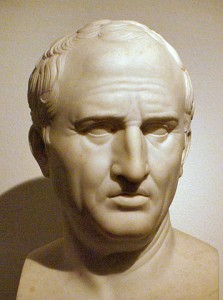 I have long said that we shouldn’t look for analogies between our cultural problems and the fall of the Roman empire. We should look for parallels with the fall of the Roman Republic. Carl Trueman says that while the position of Christianity is changing, secular society itself is changing too. He sees the rise of what he calls an “empire of desire” (a concept also treated by R. R. Reno, whom he links to). He calls for new Ciceroes who have the integrity, the wisdom, and the eloquence to defend our Republic and to resist the Imperial temptations.
I have long said that we shouldn’t look for analogies between our cultural problems and the fall of the Roman empire. We should look for parallels with the fall of the Roman Republic. Carl Trueman says that while the position of Christianity is changing, secular society itself is changing too. He sees the rise of what he calls an “empire of desire” (a concept also treated by R. R. Reno, whom he links to). He calls for new Ciceroes who have the integrity, the wisdom, and the eloquence to defend our Republic and to resist the Imperial temptations.
I would just add that while the rise of globalism and American internationalism have the flavor of Empire, the resurgent nationalist movements (Trump, Brexit, the European nationalist parties) would seem to resist Empire. Don’t they? Or does the over all authority of “desire” undermine less centralized republics also?
From Carl Trueman, Ciceronian Times Call for Ciceronian Voices| First Things:
It has become a commonplace among Christians to draw an analogy between our day and the first century. As the early Christians were a despised and marginal sect, so it seems that we today are moving towards an internal cultural exile. Yet I wonder if the situation is a little more complicated than that. It is not simply that Christianity is being moved to the margins and is starting to look weird, if not sinister, to the mainstream. The wider world in which this is happening is also undergoing significant and fascinating changes. There is an analogy here not just to the first century CE but also, I believe, to the first century BCE.
When I visited the Vatican Museum in 2009, it was not the Sistine Chapel or the various masterpieces of the Renaissance that I most wished to see. It was the bust of Marcus Tullius Cicero, which is kept in the statuary section. Since my teenage years, when I had to read his speeches against Catiline and Verres, Cicero had been a hero: Learned, well-read, a philosopher, an orator, a lawyer (well, nobody’s perfect), and a politician, he was the very epitome of the truly engaged thinker, the intellectual man of action. And he was the preeminent dissenting voice as Rome dramatically changed from a republic to an empire, a change in which Cicero himself was eventually a casualty.
That change from republic to empire was traumatic and transformed Rome (and thereby the West) forever. And it is arguable that a similar thing is happening today. Our republic, and the philosophies and social realities upon which it was built and by which it has been sustained, are giving way to an empire, an empire of desire. Whether one agrees (as I have come to do) with the arguments of thinkers like Patrick Deneen and Michael Hanby, who see the origins of our current situation in the very origins and ambitions of the American experiment, or whether one sees our current society as a disastrous malfunction of the same, there is surely consensus on the fact that things are changing in fundamental and permanent ways. Liberalism is in trouble, as is the republic built upon it. The empire of desire, of which both expressive individualism and populism are symptoms, looks set to triumph.
Description={{da|Marcus Tullius Cicero, Kopi efter romersk orginal udført af Bertel Thorvaldsen 1799-1800, Thorvaldsens Museum}} {{en|Marcus Tullius Cicero, by Bertel Thorvaldsen as copy from roman original, in Thorvaldsens Museum, Copenhagen, Denmark. Public Domain.





